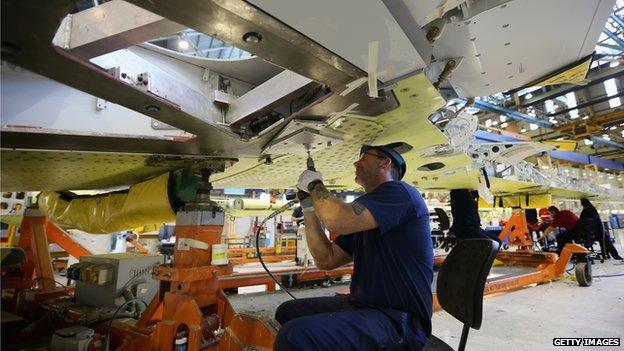Treasury argues for tax cuts
- Published
- comments

Tax cuts aim to promote economic activity
Last night the Treasury published a two-page summary of new analysis it has carried out on the "dynamic" effects of cutting taxes.
What it shows, says the Treasury, is that the cuts the chancellor has made, and is still making, to the rate of corporation tax will, over 20 years:
a) increase the long-run level of GDP by between 0.6% and 0.8%
b) and boost business investment by between 2.5% and 4.5%
c) such that between 46% and 58% of the initial loss of revenue to the Exchequer will flow back from taxes generated by the increased economic activity.
It is an argument that says tax cuts make us all richer, by promoting economic activity, and they do less damage to the public finances in the long run than the traditional "static" modelling of their impact would imply.
Now I can't judge the robustness of these calculations, because the full report is not yet available - and will be published later this morning alongside George Osborne's Autumn Statement.
But the underlying argument, that tax cuts boost economic activity, is not contentious. Where the debate will take place is over the Treasury's estimate of the amount of incremental tax revenue generated by the increased economic activity.
Some zealots for low taxes would argue the Treasury is being too conservative, and that the Treasury is bound to get back 100% of all the initial lost revenues; they would accuse Osborne of being intellectually imprisoned by the risk-averse Treasury.
Others, on the left, would see these arguments as convenient excuses for the chancellor to cut the tax burden on his friends in business.
You will know which side of this fence you are on.
But there are a couple of interesting things to say about the fact that the chancellor has ordered this analysis.
First, if the approach were adopted for modelling the impact of tax cuts and rises on the broader economy and public finances in Autumn Statements and Budgets, the chancellor would presumably hope to create a climate of opinion favouring tax cuts over tax rises.
And this, perhaps, would be only partly ideological: it would be to catch up with what the Congressional Budget Office already does in the US; and, if done consistently, there would be occasions when such modelling would show that incremental public expenditure, on infrastructure, for example, would do more to boost economic activity than some kinds of tax reductions.
Second, it looks to me something of a signal, a softening-up or confirmation, that we will have a steady-as-we-go Autumn Statement today - no massive tax or expenditure changes - in the hope and expectation on the part of the government that the UK's strongish economic recovery will be sustained, such that George Osborne can promise substantial tax cuts shortly before the 2015 general election.